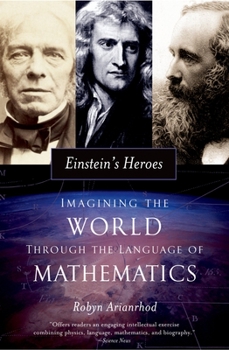Einstein's Heroes: Imagining the World Through the Language of Mathematics
Select Format
Select Condition 
Book Overview
Imagine you are fluent in a magical language of prophecy, a language so powerful it can accurately describe things you cannot see or even imagine. Einstein's Heroes takes you on a journey of discovery about just such a miraculous language--the language of mathematics--one of humanity's most amazing accomplishments.
Blending science, history, and biography, this remarkable book reveals the mysteries of mathematics, focusing on the life and work...
Format:Paperback
Language:English
ISBN:0195308905
ISBN13:9780195308907
Release Date:July 2006
Publisher:Oxford University Press
Length:336 Pages
Weight:0.60 lbs.
Dimensions:0.6" x 5.4" x 7.9"
Customer Reviews
5 ratings
Should be better known
Published by Thriftbooks.com User , 16 years ago
This book doesn't really say whether the scientists discussed were Einstein's heroes, but it does a superb job of detailing the life and work of three scientists: Newton, Faraday, and Maxwell. Focusing mainly on Faraday and Maxwell, the author shows how the relationship between these two very different men produced one of the most important contributions in the history of physics: the theory of electromagnetism and electromagnetic waves. The two men couldn't have been more different, Faraday, the self-taught, working class experimenter, and Faraday, the intuitive mathematical genius and theoretician. However, the author is quite correct in pointing out how important Maxwell thought Faraday's own theoretical ideas were, such as the idea of varying density of lines of force with distance. In fact (and the author doesn't mention this), late in life Maxwell was once asked what his most important discovery was, and he said, "Michael Faraday." One interesting theme that the author uses to good effect in the book is to show the power of mathematics as a creative language to express concepts that would be otherwise impossible. In this ability Maxwell was probably the greatest of his age, and Arianrhod points out that Maxwell, although not always the fastest with arithmetic talents, knew that mathematics at the highest level wasn't just simple arithmetic and bean-counting; it was a different language and a profound way of thinking about reality that could be used to discover the universe's otherwise hidden secrets. Maxwell understood how difficult it would be to mathematically formalize Faraday's ideas, even though he suspected Faraday was right. Their two contributions created the greatest achievement of 19th century physics, and one of the greatest scientific achievements of all time. Part biography and part popular science writing, Arianrhod's achievement recall's the great John Casti's earlier book, The One True, Platonic Heaven in it's lively blend of biography and science writing.
Clear Exposition of Mathematics and its Use in Science
Published by Thriftbooks.com User , 17 years ago
Despite its title, this book's central themes are: the work of James Clerk Maxwell and the expression of scientific principles in the language of mathematics. In discussing Maxwell's life and work, the author allows a few excursions mainly into the work of Newton and Faraday - work related to that of Maxwell. In addition, the book contains a few digressions on some extremely basic mathematical principles, e.g., basic geometry, basic algebra, elementary graphs, etc. - material that is likely covered at the junior high school level if not earlier. Other material is presented on more advanced concepts such as vectors and vector spaces. The explanations are so clear, basic and painless that this book should be very popular among those who are mathematically challenged but who would like to know more about important scientific developments that have a mathematical flavor. As stated, the prose is quite clear, friendly and engaging. Science buffs that are better versed in mathematics should also enjoy this book because of its fascinating historical and biographical information.
great book
Published by Thriftbooks.com User , 18 years ago
full of information, history and math. great anedoctes about Maxwell and a demonstration of scientific collaboration. I read this book very quickly for a book about science.
Power of mathematics in physics
Published by Thriftbooks.com User , 18 years ago
The earlier reviews of this book give a good idea of its contents, but I would add that the author's larger point is that the greammer of mathematics can lead scientists to come to conclusions that would be by no means obvious. For example, James Clerk Maxwell did not expect his mathematical formulation of Faraday's idea of electrical and magnetic fields to indicate that these fields propagate at the speed of light. This result lead Maxwell to hypothesize that light was electromagnetic radiation, and that it should come in forms other than familiar, visible light.
Great overview of the influences on Einstein
Published by Thriftbooks.com User , 18 years ago
This book gave a valuable overview of the influences of Newton, Faraday, and Maxwell, and how their discoveries led from Newton's inverse square law of gravitation, Faraday's electric and magnetic fields, and to Maxwell's work that mathematically described electromagnetic waves are the same as light waves. The book contains a few equations, but those do not need to be understood to appreciate the discoveries and contributions of the scientists who contributed to our current knowledge. I will further my knowledge by digging deeper into the mathematics of these scientist to further my knowledge, but this book was a great start for me.





